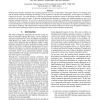404 search results - page 35 / 81 » Extending Fuzzy Description Logics for the Semantic Web |
AGP
2003
IEEE
14 years 28 days ago
2003
IEEE
Abstract The Semantic Web (SW) can be seen as abstract representation and exchange of data and metadata. Metadata is given in terms of data mark-up and reference to shared, Web-acc...
LREC
2010
13 years 9 months ago
2010
Ontology-based semantic annotation aims at putting fragments of a text in correspondence with proper elements of an ontology such that the formal semantics encoded by the ontology...
SEMWEB
2005
Springer
14 years 1 months ago
2005
Springer
There has been considerable debate as to the merits and the applicability of probabilistic or statistical reasoning to Semantic Web. Much of this debate seems to have centered on ...
FLAIRS
2009
13 years 5 months ago
2009
Ensuring the consistency and completeness of Semantic Web ontologies is practically impossible, because of their scale and highly dynamic nature. Many web applications, therefore,...
APWEB
2006
Springer
13 years 11 months ago
2006
Springer
In the semantic web context,the formal representation of knowledge is not resourceful while the informal one with uncertainty prevails. In order to provide an uncertainty reasoning...

